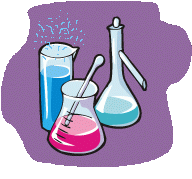


Description of experiment
Below follows a plain text transcript of the selected experiment.
![]()
Needed compounds:
-----------------
nitric acid : HNO3
hydrogen peroxide : H2O2
sodium hydroxide : NaOH
silver nitrate : AgNO3
Class:
------
elem=Ag
precipitation
redox
Summary:
--------
Silver (I) ions, when treated with hydroxide give brown silver (I) oxide.
When hydrogen peroxide is added, then that is decomposed and the precipitate
of oxide does not change noticeably. When, however, hydrogen peroxide is
first mixed with a solution of a silver (I) salt and then the hydroxide is
added, then a black precipitate is formed. Probably this is finely divided
metallic silver.
Description:
------------
Sequence 1:
------------
Add a solution of silver nitrate to a solution of sodium hydroxide: Formation
of a brown precipitate of silver (I) oxide.
Add some hydrogen peroxide (10% by weight): A lot of gas is produced, liquid
starts foaming vigurously. The color of the precipitate does not change.
Heat the liquid: The color of the precipitate does not change.
Add some dilute HNO3 (appr. 1 mol/l): The precipitate dissolves for the largest
part, no gas is evolved. The liquid becomes almost clear and colorless.
Sequence 2:
------------
Add a solution of silver nitrate to some hydrogen peroxide (appr. 10% by
weight): No visible changes, liquid remains clear and colorless.
Add a solution of sodium hydroxide: Immediate strong foaming of liquid, it
almost goes out of the test tube. A black precipitate is formed.
Heat the liquid: The precipitate remains black. Its structure becomes more
coarse.
Add some dilute HNO3 (appr. 1 mol/l): Part of the precipitate dissolves, but
a fairly large part also remains solid. The color of the remaining solid is
grey/brown.
Decant the liquid and add some HNO3 (appr. 50% by weight) to the remaining
grey solid: The solid dissolves with the formation of a gas. The air above
the liquid becomes light brown.
![]()